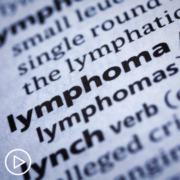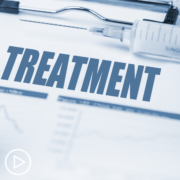Follicular Lymphoma Research and Treatment Updates
Follicular Lymphoma Research and Treatment Updates from Patient Empowerment Network on Vimeo.
Dr. Matthew Matasar shares follicular lymphoma treatment and research highlights from the 2022 American Society of Clinical Oncology (ASCO) meeting.
Dr. Matthew Matasar is a lymphoma expert at Memorial Sloan Kettering Cancer Center and Chief of Medical Oncology at Memorial Sloan Kettering Bergen. To learn more about Dr. Matasar, visit here.
See More from The Pro-Active Follicular Lymphoma Patient Toolkit
Related Programs:

|

What Treatment Options Are Available for Relapsed Follicular Lymphoma? |

|
Transcript:
Katherine Banwell:
Cancer researchers recently came together to share findings at the annual American Society of Clinical Oncology meeting also known as ASCO. Are there highlights from the meeting that follicular patients need to know about?
Dr. Matasar:
The pace of innovation in follicular lymphoma is absolutely breathtaking. And the treatment options that are being explored and coming available to us now are really extraordinary. And they’re extraordinary because they offer this unparalleled possibility of very highly effective and less toxic, fewer less long-term and short-term side effects than prior options may have afforded us.
This is particularly true in two general areas of investigation. The first is what we call immunotherapy or treatments that are designed to leverage your own immune system’s ability to kill cancer cells. And the second is what we would call targeted therapies, treatments that are designed to attack a specific enzyme, or protein, or pathway that is relied upon by follicular lymphoma cells to survive and to grow.
Immunotherapy for follicular lymphoma is perhaps the most exciting of everything right now. And there’s a class of agents that are called bispecific antibodies. These are antibodies or proteins that have two specific regions on them, one that binds onto the surface of the follicular lymphoma cell and one that serves as sort of an activator or tractor beam for your own body’s healthy T cells. So, it attaches to the B cell. It drags over and stimulates T cells, and says, “Get them, guys.” And it causes your own body’s T cells to recognize, attack, and kill lymphoma cells for you.
There’s a number of these agents that are in active clinical development. And we say updates at ASCO this year showing that these agents are very effective at treating follicular lymphoma even when prior chemotherapy agents have been unsuccessful at achieving durable remissions with really very little toxicity particularly after the first month of treatment is under your belt.
Katherine Banwell:
What are you excited about when it comes to follicular lymphoma research?
Dr. Matasar:
What I’m excited about is the overall pace of innovation. We have more drugs that are approved in the treatment of this illness in the last five years than in the 20 years that preceded it. And we have more options that we expect to become available over these next three years than were approved in the last five, immunotherapy, targeted therapy, therapies that modified the genetic signatures of the cells, treatments that used living cells and genetically modified those cells to attack your lymphoma, combinations of immunotherapies and targeted therapies.
The innovation is really extraordinary, and it gives me tremendous hope that over these upcoming years, I’m going to have even more choices to offer my patients with follicular lymphoma, ways to improve their quality of life, the length of their life, and to find better ways to manage this illness.
Katherine Banwell:
That sounds so promising.










